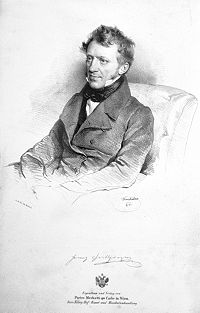Grillparzer
| Franz Grillparzer | |
|---|---|

Lithograph by Josef Kriehuber, 1841
|
|
| Born | 15 January 1791 Vienna, Austria |
| Died |
21 January 1872 (aged 81) Vienna, Austria-Hungary |
| Occupation | Dramatist |
| Nationality | Austrian |
Franz Seraphicus Grillparzer (15 January 1791 – 21 January 1872) was an Austrian writer who is chiefly known for his dramas. He also wrote the oration for Ludwig van Beethoven's funeral.
Franz Grillparzer was born in Vienna, Austria. His father, E.J. Grillparzer, was a severe pedant and a staunch upholder of the liberal traditions of the reign of Joseph II, and was an advocate of some standing. His mother, Anna Franziska, was a nervous, highly-strung woman who belonged to the well-known musical family of Sonnleithner.
His father destined Grillparzer for the legal profession, and, after a desultory education, Grillparzer entered the University of Vienna in 1807 as a student of jurisprudence. Two years later his father died, leaving the family in difficult circumstances. After obtaining his degree from the university in 1811, Franz first became a private tutor for a noble family; then in 1813, he entered the civil service as a clerk at the Imperial and Royal Hofkammer (Exchequer) in Austria. In 1821, he unsuccessfully applied to the position of scribe at the Imperial Library, and later that same year, he was relocated to the Ministry of Finance. In 1832, he became director of the archives at the Imperial and Royal Hofkammer, a position he held until his retirement in 1856. Grillparzer had little capacity for an official career and regarded his position merely as a means of independence.
From early youth, Grillparzer displayed a strong literary impulse. He devoted especial attention to the Spanish drama, and nearly all his writings bear marks of the influence of Calderón. His autobiography, which was written in 1853 and brings down the narrative of his life to 1836, is a model of clear, simple, and elegant prose, and it throws much interesting light both on his personal character and on the tendencies of his time. Among his posthumous writings are many fragments of literary, philosophic, and political criticism, all of them indicating a strong and independent spirit, not invariably just, but distinct, penetrating, and suggestive.
It is characteristic of him that he expresses extreme dislike of Hegel's philosophy on the ground that its terms are unintelligible. On the other hand, he gives evidence of careful and sympathetic study of Kant. Of modern literary critics, Gervinus was most repugnant to him, mainly because of the tendency of this writer to attribute moral aims to authors who created solely for art's sake. He rather maliciously says that Gervinus had one advantage and one disadvantage in writing his history of German literature, — the advantage of common sense, the disadvantage of knowing nothing of his subject.
...
Wikipedia
